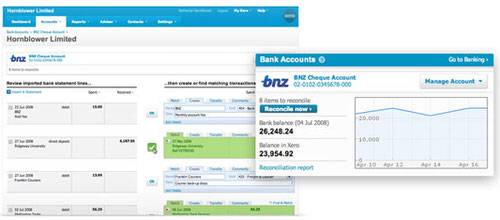Last week we analyzed how the Web is transforming personal finance. Today we’ll take a broader look at the world of online finance, from personal to small business tools. To get an understanding of the online finance space, we spoke to the founder and CEO of one of the most promising startups in online finance, Rod Drury from Xero. Rod told us that he sees four types of markets in online finance: 1) Personal Finance (e.g. Mint, Wesabe, Yodlee); 2)
Small Business Accounting (e.g. Xero, Kashflow); 3)
Cloud ERP (e.g. Netsuite, Salesforce); and 4)
ERP (e.g. Microsoft, Oracle).

That segmentation makes sense to us, to let’s look now at how the online finance market is shaping up.
RWW’s Online Finance Series:
Editor’s note: This story is part of ReadWriteWeb’s Online Finance series, a weekly, three-month long look at how the Internet has transformed finance. Up until April 15, the deadline for U.S. readers to file their taxes, we’ll be looking at how finance software has evolved, analyzing top web tools and posting video of our conversations with the people who are shaping online finance. If you are interested in sponsoring the rest of this Content Series, please contact our COO Sean Ammirati.
In our overview of Personal Finance, we explained how free tools like Mint, moneyStrands and Wesabe are making it easy for consumers to monitor their income and expenditure. The current market leader in personal finance is Mint, which was acquired by Intuit in October 2009. Today Mint has more than 1.7 million registered users, about 700,000 of them active every month.

The online small business accounting market is less well formed at this time, which means there are opportunities for startups. Particularly as for years now small business owners have had to suffer relatively expensive and complex desktop software – such as MYOB, Intuit QuickBooks and Microsoft Office Accounting.
Internet DNA
In an August 2008 article, we wrote that many of the small business accounting software incumbents were struggling to make the transition to online accounting. That was one reason why leading financial software firm Intuit acquired Mint, to import some Internet DNA. Just months later and Intuit is already planning to phase out Quicken Online and replace it with Mint.
Just as Mint came out of the web 2.0 world to re-shape the Personal Finance market, it will likely be a web-based company that does the same to the small business accounting market. It may end up being Xero, a completely online accounting service which was founded in July 2006. Xero hails from New Zealand, but is aiming for global success. Full disclosure, ReadWriteWeb uses Xero to manage its accounts. We’ve found the integration with online banking systems to be impressive, the design slick, and functionality such as multi currencies useful. Perhaps most importantly, Xero has the support of many accountancy firms.


Playing in Multiple Markets
According to Xero founder Rod Drury, another trend in the online finance space to watch is that “each vendor might play in the adjacent market as it’s good exposure.” We’ve seen this happening for years with the likes of Intuit and Microsoft. But now even the small players, such as Xero, are doing it. Drury says that for his firm, doing personal finance “creates a great opportunity to talk to banking partners and enables us better access to banking web services.” He added, “it’s a useful marketing tool, though the primary monetization is upsell to the business product.”
We’ll discuss Cloud ERP products in a separate post, so for now please tell us your thoughts on personal and small business online finance tools. Which products do you use, whether for personal finance use or your business?
Image credit: An&
















